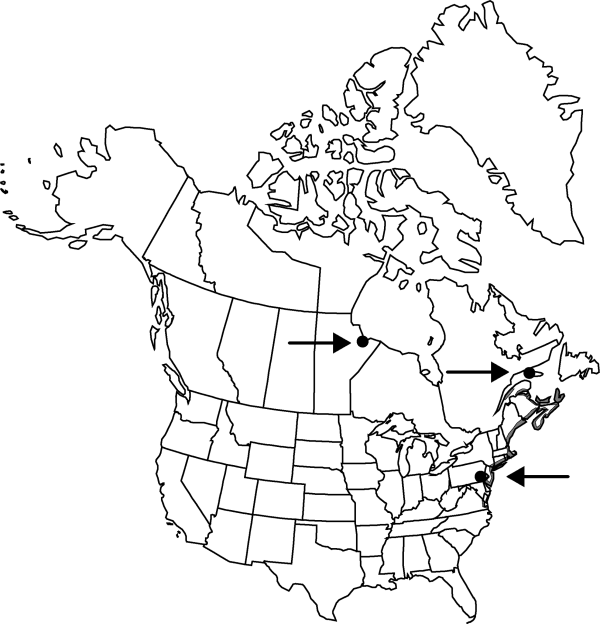Difference between revisions of "Suaeda maritima"
Fl. Belg., 22. 1827.
FNA>Volume Importer |
FNA>Volume Importer |
||
| Line 8: | Line 8: | ||
}} | }} | ||
|common_names=White sea-blite | |common_names=White sea-blite | ||
| − | |basionyms={{Treatment/ID/ | + | |basionyms={{Treatment/ID/Basionym |
|name=Chenopodium maritimum | |name=Chenopodium maritimum | ||
|authority=Linnaeus | |authority=Linnaeus | ||
| + | |publication_title=Sp. Pl. | ||
| + | |publication_place=1: 221. 1753 | ||
}} | }} | ||
|synonyms={{Treatment/ID/Synonym | |synonyms={{Treatment/ID/Synonym | ||
| Line 36: | Line 38: | ||
|elevation=0-10 m | |elevation=0-10 m | ||
|distribution=Man.;N.B.;Nfld. and Labr. (Nfld.);N.S.;P.E.I.;Que.;Conn.;Maine;Mass.;N.H.;N.J.;N.Y.;Pa.;R.I.;Va.;Europe;Asia (Arabia);Africa;Pacific Islands (Japan;New Zealand). | |distribution=Man.;N.B.;Nfld. and Labr. (Nfld.);N.S.;P.E.I.;Que.;Conn.;Maine;Mass.;N.H.;N.J.;N.Y.;Pa.;R.I.;Va.;Europe;Asia (Arabia);Africa;Pacific Islands (Japan;New Zealand). | ||
| − | |discussion=<p><i>Suaeda maritima</i> is a polymorphic taxon with a worldwide distribution, including native and naturalized populations. Many varieties and subspecies have been described, mostly distinguished by seed size and growth habit (J. Boucaud 1962; I. J. Bassett and C. Crompton 1978). Small, procumbent, mat-forming plants from Newfoundland and Nova Scotia with seeds 1–1.5 mm in diameter have been called subsp. richii, whereas <i></i>subsp.<i> maritima</i> has seeds 1.5–2 mm in diameter (I. J. Bassett and C. W. Crompton 1978). Seed dimorphism has been reported from populations in Europe (D. Metzing 1996) and may also exist in some North American populations.</p> | + | |discussion=<p><i>Suaeda maritima</i> is a polymorphic taxon with a worldwide distribution, including native and naturalized populations. Many varieties and subspecies have been described, mostly distinguished by seed size and growth habit (J. Boucaud 1962; I. J. Bassett and C. Crompton 1978). Small, procumbent, mat-forming plants from Newfoundland and Nova Scotia with seeds 1–1.5 mm in diameter have been called subsp. richii, whereas <i></i></i>subsp.<i><i> maritima</i> has seeds 1.5–2 mm in diameter (I. J. Bassett and C. W. Crompton 1978). Seed dimorphism has been reported from populations in Europe (D. Metzing 1996) and may also exist in some North American populations.</p> |
|tables= | |tables= | ||
|references= | |references= | ||
| Line 60: | Line 62: | ||
|publication year=1827 | |publication year=1827 | ||
|special status= | |special status= | ||
| − | |source xml=https://jpend@bitbucket.org/aafc-mbb/fna-data-curation.git/src/ | + | |source xml=https://jpend@bitbucket.org/aafc-mbb/fna-data-curation.git/src/f6b125a955440c0872999024f038d74684f65921/coarse_grained_fna_xml/V4/V4_776.xml |
|genus=Suaeda | |genus=Suaeda | ||
|section=Suaeda sect. Brezia | |section=Suaeda sect. Brezia | ||
Revision as of 20:02, 24 September 2019
Herbs, annual, prostrate to ascending, occasionally erect, sometimes forming mats, glaucous or green, 0.5–10 dm. Stems prostrate, decumbent, or erect, usually light brown, simple or branched, sometimes slightly woody at base; main branches arising from proximal part of plant. Leaves ascending or spreading; blade linear, usually subterete, sometimes flat, 10–50 × 0.8–1.7 mm, apex blunt to acute. Glomes on main stem and lateral branches, not crowded into compound, distal spikes, 1–4-flowered; proximal bracts resembling leaves, distal bracts gradually reduced, 3–12 mm, slightly wider at the base. Flowers bisexual; perianth actinomorphic to slightly irregular with segments subequal, 2–3.3 mm diam.; perianth segments thin to abaxially rounded and occasionally distally hooded at maturity, without appendages, apex obtuse; stigmas 2–3(–5). Seeds monomorphic, lenticular, 1–2.2 mm diam.; seed coat reddish brown or black, reticulate. 2n = 36.
Phenology: Flowering late summer–fall.
Habitat: Coastal salt marshes, ballast
Elevation: 0-10 m
Distribution

Man., N.B., Nfld. and Labr. (Nfld.), N.S., P.E.I., Que., Conn., Maine, Mass., N.H., N.J., N.Y., Pa., R.I., Va., Europe, Asia (Arabia), Africa, Pacific Islands (Japan, New Zealand).
Discussion
Suaeda maritima is a polymorphic taxon with a worldwide distribution, including native and naturalized populations. Many varieties and subspecies have been described, mostly distinguished by seed size and growth habit (J. Boucaud 1962; I. J. Bassett and C. Crompton 1978). Small, procumbent, mat-forming plants from Newfoundland and Nova Scotia with seeds 1–1.5 mm in diameter have been called subsp. richii, whereas subsp. maritima has seeds 1.5–2 mm in diameter (I. J. Bassett and C. W. Crompton 1978). Seed dimorphism has been reported from populations in Europe (D. Metzing 1996) and may also exist in some North American populations.
Selected References
None.